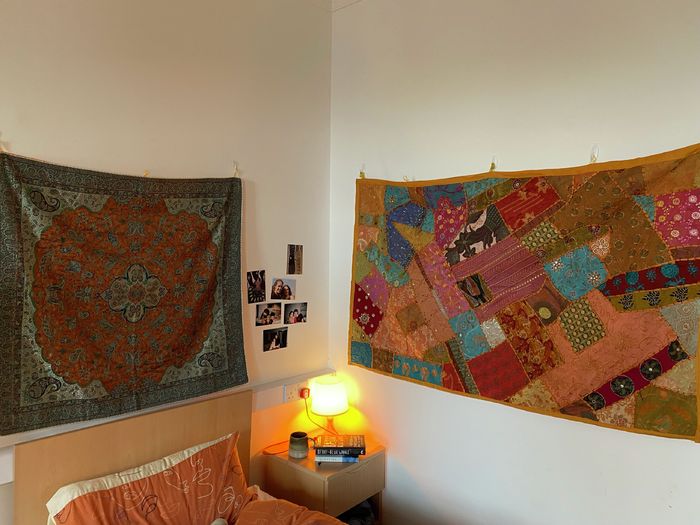Exhausted and borderline delirious on the penultimate day of a long Lent term, I find myself outside Chads, the second year iteration of St Catz. Nestled between Wilberforce sports grounds and the UL, Poppy’s room is possibly the furthest I’ve ventured towards Sidgwick site since week five. Her room offers a technicolour cosiness, the perfect respite for post-term tiredness, swathed in patchwork blankets and freckled with vibrant crafting endeavours.
“I went through a phase of making squares out of any old yarn I could find”; her bedside table is swaddled with a throw, incidentally matching the one adorning her bed. “The original idea for this was it was going to be a throw for my uni bed, but then I realised it was going to take way more effort than I thought”. However, as if fated in the crocheted stars, like the bunting draped along the room’s perimeter, an almost identical one stumbled into her path in a local charity shop. Compelled to buy it, Poppy recognised its sentimentality. “It’s definitely homemade by someone’s grandma or something – I understood how much effort has gone into making this”, she reflected, with its measly £3 price point breaking her heart. A self-described maximalist, especially when it comes to colour, Poppy’s room is flooded with the sparks of intensity: “I like a lot of colour, and like to have no empty space.” Unsatisfied with university-prescribed grey carpeting, her bed is surrounded by a pale blue rug with delicate white embroidery, while the same intricate work extends to her hand-drawn lampshade, its beige blankness replaced with pencil imaginings of woodland scenes.

Patchworked like her quilt, Poppy is multitudinous; with her own life resisting the mundanity she rebukes in her decorating, she describes her space as “a happy hodgepodge” and a bit of a “motley mess”. JCR president, university-level water polo player, runner, saxophonist and emerging interior design whiz, her room contains snapshots of her life, held in collaged mugs, a salvaged yoga ball rescued from the JCR, and an overflowing music stand swelled with the promise of future performances. They reside together harmoniously like the collaging upon her expansive pinboard. Populated by handcrafted Galentines cards from devoted friends, photographs catalogue the holiday adventures echoed in the sunflower plate perched on her bathroom cabinet, a reminder of warmer Athens adventures.

Poppy’s pinboard, like most of her room, brims with gifts from far flung friends or closer family – like the pop-up flowers sent by her mum, circumnavigating a traditional bouquet’s inevitable demise – or products of her endless creative talents – like her hand painted clock, with its face illustrated by books whose titles share the number of each hour. As she recollects “my mum sent me an actual bouquet of flowers for my birthday last year, and this year she sent me a bouquet of pop-up flowers”, these items add a sense of permanence to a space that can feel fleeting. This ephemerality is echoed in the hostility caused by a lack of common spaces; because “no one wants to traipse over to the JCR common room to go and have breakfast together”, this inevitably leads to perching in stairwells and on countertops during meal times, with the little common time we share snagged by architectural realities.

Also brimming with this devotion to friendships is Poppy’s jewellery box, populated by micro crocheted earrings from her flatmate, alongside a set of earrings from her first visit to the Cambridge anthropology museum. “Even though we never had an open day because of COVID, I convinced my mum to go on a day trip to Cambridge to look around… It was really sunny, and I fell in love with Cambridge.” Just like her recent half marathon, where “some of us went wrong at the end and lost the finish line; it was so wet and muddy I was like bambi on the ice”, this memento brings her back to what matters: “it always reminds me that – although things might get tough – it reminds me how much I wanted this”.

Our days are collations of lectures, supervisions and socialising, punctuated by societies and endless Mainsbury’s trips, from which we glean all that we can from the time available – even if that means eating pasta perched on a cupboard. Each one comprises another stitch in the ever-increasing squares that constitute our university experiences. Days can feel colourful, but many make us want to retreat to the safety of our charity shop blankets.
Poppy is surprisingly optimistic about the impending term, as it “starts with C-Sunday and ends with May balls”; I only hope that this next square in the blanket is colourful, neon even, radiating a term which may be eclectic and overwhelming at times, but holds space for comfort and colour. As we pull ourselves through the mud, temporarily losing sight of the finish line, we need to be reminded to look for the vibrancy, staying warm beneath the potential of perfect charity shop destinies, and remind ourselves of those first sunny Cambridge days.



